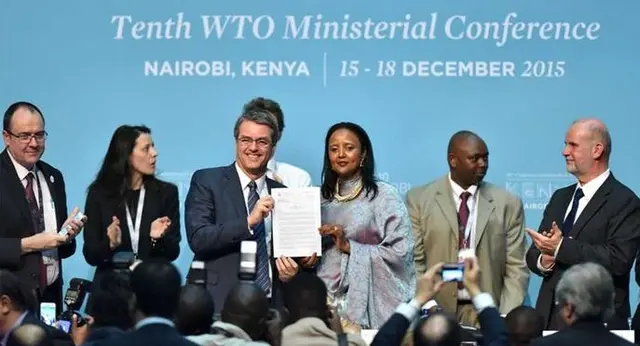The 10th Ministerial Conference of the World Trade Organization (WTO) concluded in Nairobi, Kenya, Saturday after an extended negotiating period with a new Nairobi Declaration that promises to keep the international trading system alive.
Key outcomes out of the conference included an agreement on the elimination of agricultural export subsidies, expansion of the list of information and technology products for tariff reduction, and the accessions of Liberia and Afghanistan into the world trade body.
"We are creating a new habit of success," said WTO Director-General Roberto Azevedo, referring to the first major successful conclusion of a ministerial conference since 2001. "The decisions will improve the lives of the people of Africa. The process was not perfect, but we have delivered."
The ministerial meeting, first of its kind being held on African soil in two decades, brought together ministers from 162 members of the world trade body.
According to the Nairobi Declaration approved at the conference, developed members shall immediately eliminate their scheduled export subsidies while the developing country members shall do so by 2018.
However, to ensure that the rules do not interfere with local food security initiatives, the ministers also agreed on another package to protect state-sponsored initiatives from being classified under the new deal. The ministers agreed the food security initiatives would allow food stockpiles until 2017.
The decision was taken to ensure that the food security initiatives do not compromise the broader deal of ensuring the playing field in agricultural trade is level to allow all players to compete equitably.
Azevedo said the outcome of the conference on eliminating the domestic support to large scale producers of food was historic.
"The decisions are most historic. The elimination of the export subsidies is extremely important. It removes distortions and helps create a level playing field. It will also regulate the food aid and ensure that the exports do not affect local production," said the WTO chief.
"The WTO members -- especially the developing countries -- have consistently demanded action on this issue due to the enormous distorting potential of these subsidies for domestic production and trade. Today's decision tackles the issue once and for all," Azevedo told delegates in his closing statement.
The ministers also agreed to eliminate all forms of export subsidies provided to cotton farmers in rich countries and agreed on a plan to allow cotton farmers in Africa unfettered access to their markets.
The agreement covering cotton provides 2016 as the first date from which the poor countries, which include 35 Least Developed Countries (LDCs) and the Cotton Four countries in Africa -- Burkina Faso, Benin, Chad and Mali and other developing countries -- can begin to export cotton duty-free.
"We achieved a package of outcomes which would contribute to development. We are happy. We hope to carry a message of hope," said Amina Mohammed, Kenyan foreign minister and the conference's chairperson.
The ministers also endorsed the Information Technology Agreement (ITA) expansion, which expands the range of information technology products for tariff cuts. Azevedo hailed the expansion as a "historical breakthrough" because it would exempt global trade worth 1.3 trillion U.S. dollars from taxation.
During the conference that kicked off Tuesday, Afghanistan and Liberia, two LDCs, were also approved to join the WTO.
"For the first time, we have a ministerial declaration that is so clear. There are different views on how to move forward. We all want a multilateral system that is agile and we will continue to negotiate," said Azevedo.
 简体中文
简体中文

